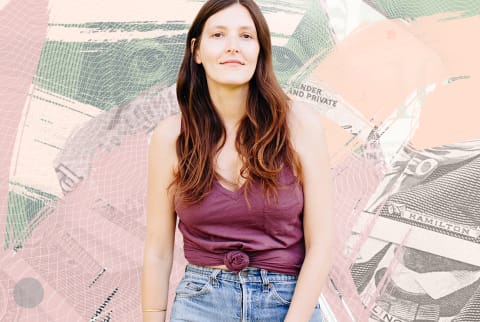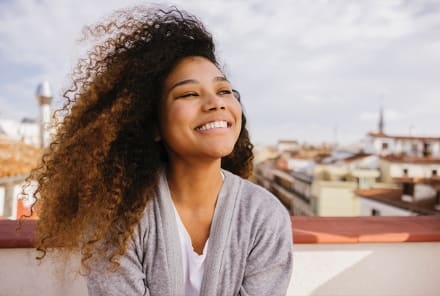Advertisement
The Finance Book That Helped Ashley Neese Ditch The Scarcity Mindset


Renowned breathwork coach and mbg Collective member Ashley Neese is known to bring a calming, grounded energy to just about everything she does. Leading up to the release of her beautiful new book, How to Breathe: 25 Simple Practices for Calm, Joy, and Resilience (out this week!), mbg caught up with Neese to learn about how this mindful awareness translates to her financial life. Along the way, she shared the tools, books, and mantras that keep her in a place that feels abundant—even when money is tight. Grab a pen; here are the highlights.
What does financial well-being mean to you?
For me, financial well-being is having the freedom to make choices for myself and for my family. Also, it's being able to track and meet whatever my financial goals are, quarterly or annually. The last piece is having mindfulness around what I'm spending and where my money is going. Am I spending mindlessly, or am I spending consciously?
How can you tell when you're spending consciously?
I know that I'm spending money unconsciously when I'm not tracking anything. I'll just think, "It's fine, it's fine" and not pay attention to what I'm doing.
For me, that's a slippery slope because I do have a history of spending money and racking up debt. So much of that was tied to my self-worth. I wouldn't sit down and handle my finances because I was so scared. It's about moving through that fear, and thinking, "OK, if I actually pay attention, it's not that scary. It's OK that I'm not making what I want to make now." Bringing the consciousness into it just keeps me in reality about what I'm doing. It keeps me accountable.
What has your financial journey looked like up until this point?
I was very fortunate to grow up with parents who were able to afford to send me to really good schools when I was young. I got a really grounded education. Interestingly, my dad is a financial and wealth planner, so we grew up with him teaching us all about things like the stock market. At the time I thought, "This is the most boring thing ever." I couldn't have cared less. But now as an adult, I've realized how so few people have access to that information from a young age.
When I was in college, I kind of went in a totally opposite direction and was just spending, spending, spending way more than I was making and racking up debt quite a bit. I definitely wasn't using the tools that I grew up with at all. I really had to go in that opposite direction so I could find whatever that middle ground was for myself.
Another big piece of my financial journey in terms of owning my own business is learning how to value myself and put a dollar amount on the work that I do. That in and of itself has been a huge, huge learning curve. For years, I undercharged all the time because I was so insecure about my work. I also started doing my work really young, and I was like, "God, I have these clients who are older than me and who obviously know more than me just because they're older, so how can I charge any more?" There was so much insecurity around my own finances, self-worth, and how much I could charge, and that's definitely been a piece I've had to do a lot of work around.
What tools helped you work through that phase of financial insecurity?
My friend handed me this book by Catherine Ponder called The Dynamic Laws of Prosperity. In it, she talks a lot about money as energy and how abundance and prosperity is a mindset versus what you have in your house. Her book walked me through what it means to have a mindset of abundance and how to focus on abundance, opportunities, gratitude, and what you can make more of easily.
I went through her entire book and did all of the practices. One of the biggest take-aways for me was her practice of tithing, which is when you give away 10 percent of your income every year to an organization, charity, or cause that you feel really excited about. When I started, it was really scary because I was like, "I'm giving away 10 percent of my income and I'm not really making that much. This seems kind of crazy." But taking that risk really shifted my perspective and my energy around money, and then within four months, so much more abundance was flowing in. It was really wild.
The book also showed me how to look at my finances from a very holistic perspective. So maybe dollars weren't necessarily coming in, but then all of the sudden, a friend would be like, "I want to make you lunch, take you out to dinner, or offer you a massage." The wealth was coming in a lot of different ways.
Do you have any financial mantra that you like to follow?
The piece around abundance is really, really important to me. For me, that's really tied into gratitude, so I'll remind myself what I'm grateful for every day.
I remember when I first started my practice and only had a few clients; instead of thinking, "How am I going to pay my rent? Oh my God. How is this going to happen?" I shifted my perspective to, "Isn't it great that I have four clients who want to pay me? Let's focus my energy there."
Are there any free or inexpensive self-care tools that you have learned to love over the years?
Of course, breathwork is No. 1! The other tool I've been employing a lot, especially as a new mom, is walking. I go to the Redwoods and spend a lot of my time with the trees, grounding my energy there because it's free, really close to my house, and beautiful. Honestly, just getting out in nature whenever I can is one of my favorite ways to take care of myself.
Another thing I love to do is take ginger baths. I'll just put fresh or dried ginger in the bath and give myself a gentle detox once a week. It's warming and so good now that it's spring and we're in that damp, rainy season.
And honestly, rest (which I'm not getting much of now because I'm a new mama) is one of my favorite ways to practice self-care.
How else has becoming a new mom shifted the way you view finances?
It's got me saving more. My partner and I really want to be able to model healthy relationships with money for our son. So we're really paying attention to what we have, being conscious of it, and treating it with respect and reverence. We're grateful for what we have. I think that was missing for a little bit in my house growing up. There was so much abundance, but there wasn't a lot of gratitude, so it was really easy to take things for granted.
What do financial conversations with your partner look like?
When we first got together, they were pretty challenging conversations. I was crying a lot. My journey with money hasn't been this upward slope the entire time. There's been a lot of upward momentum, and I've had some places where I made some unwise choices and had to pick myself back up. One of the biggest mistakes I made when my practice first started to grow was I fell back into that trap of spending more than I was making.
With Nick, when we met, I was in this place of having to reorganize myself, get back into my prosperity work, and reevaluate what I was spending. He would ask where all my money was going. Honestly, it was embarrassing. But it was just about being able to be honest with him. He helped guide me back to the practices I had been doing before that worked, and he helped me set up a budget for myself.
Now, every month I know what I can spend and save. That's really important for us as a family. We can have our finances be separate, but we want to be on the same page as far as what our joint finances are and how we want to work with that.
What was the best money you ever spent?
Anytime I'm investing in myself, whether that is going to a teacher training, going on a retreat, getting acupuncture, seeing my osteopath, or going to the farmers market and splurging on some amazing seasonal produce. Anything I'm doing to invest in myself for me is 100 percent money well spent every time.
This interview has been edited and condensed.
Watch Next
Enjoy some of our favorite clips from classes
Enjoy some of our favorite clips from classes
What Is Meditation?
Mindfulness/Spirituality | Light Watkins
Box Breathing
Mindfulness/Spirituality | Gwen Dittmar
What Breathwork Can Address
Mindfulness/Spirituality | Gwen Dittmar
The 8 Limbs of Yoga - What is Asana?
Yoga | Caley Alyssa
Two Standing Postures to Open Up Tight Hips
Yoga | Caley Alyssa
How Plants Can Optimize Athletic Performance
Nutrition | Rich Roll
What to Eat Before a Workout
Nutrition | Rich Roll
How Ayurveda Helps Us Navigate Modern Life
Nutrition | Sahara Rose
Messages About Love & Relationships
Love & Relationships | Esther Perel
Love Languages
Love & Relationships | Esther Perel

















